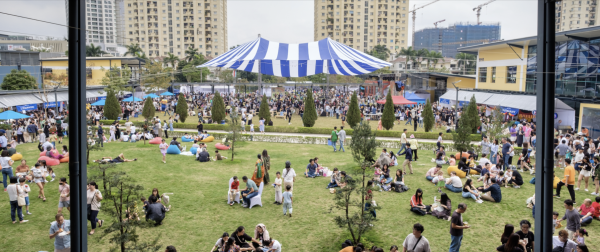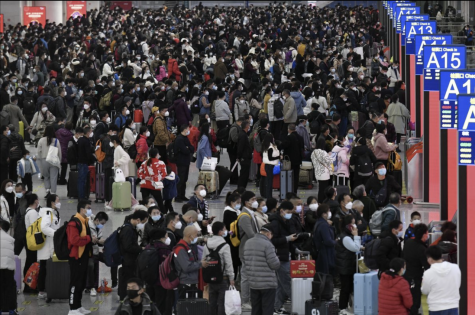Communication in the Digital Age: How Social Media Impacts UNIS Students for Better or for Worse
Have you ever opened YouTube to watch one video and then, after three hours, found yourself watching videos that you never knew existed which you weren’t even interested in watching? Have you found yourself constantly opening your phone to check whether you have any new messages or notifications? Despite the many ways social media has improved the quality of our lives, here are a few examples of the undesirable effects that have risen due to the development of social media and the rapid rise in its use in the last decade. Although these effects seem trivial, interviews and survey results from UNIS students and faculty demonstrate that social media has a significant impact, both positive and negative, on student life and well-being.
UNIS students spend a lot of time on social media. According to a survey made by the members of The Flame, 25.9% of respondents rated 5 from a scale of 0 to 10 when it comes to how much time they spend on social media. 0 being “I don’t spend time on social media at all,” and 10 being “I am constantly on social media at every opportunity I get.” 0% of respondents rated levels 0 and 1.
Grade 11 student Emma Héloïse Dufour Nogueira uses social media for three to four hours per day. “It’s really good for group projects because then I get to talk to my team in general,” she said. “With social media, I’m able to contact them. No one uses texts anymore.”
In addition to its benefits for group projects, the survey results also revealed other advantages of social media. The most common is better communication, but other responses also touched upon benefits such as better networking opportunities, having more awareness, political or otherwise, and the exposure to many sources and forms of entertainment. Despite these positives, the disadvantages of social media usage should not be overlooked.
One undesirable effect that was mentioned numerous times in the survey and in interviews was the addictive quality of social media and the procrastination it can cause.
“Since social media is so addictive, I tend to forget whatever I’m doing,” said Grade 11 student Anushka Biswas. “It doesn’t help me focus, especially when I’m doing homework.”
Most social media is based on underlying algorithms that focus on maximizing the time users spend on these platforms. These algorithms gather data on how users have engaged and interacted with content in the past, to predict and filter the content that users most likely would enjoy and find relevant in the future. Essentially, these algorithms try to keep users on the platform as long as possible. Even though these algorithms provide great marketing benefits for the platforms themselves, they may have many undesirable impacts on its users.
Many respondents mentioned that social media can lead to procrastination, which decreases productivity. Surely these negative qualities must impact schoolwork and learning, and such can be seen within the results of the survey. 46.6% of respondents answered “Yes, in a negative way,” to the question: “Do you think social media affects your concentration?” Similarly, 20.7% answered that their performance at school has been negatively affected by social media. These statistics provide evidence suggesting that the procrastination from social media could lead to lower concentration rates and lower academic performance.
“Social media makes me procrastinate, thereby causing higher stress levels,” one respondent answered.
Another undesirable effect of social media along with procrastination seems to be the unhealthy comparison that it can lead to. “It has been my observation, that students become, not just students, I think this impacts adults also, they become very responsive to the hits they get on social media,” said UNIS HS Counsellor, Casey Nolen-Jackson. “[People] become fixated by the ‘ding’ they get on their phone or their computer that they had a like, or how many likes they have compared to others, or how many friends they have compared to others,” she said, “I think that if social media, for you, becomes about that competitive process, or that comparative habit, comparison will always lead to anxiety.”
Provided with such evidence of the negative impacts of social media, surely something must be done. Several health experts, such as UK Secretary of State for Health and Social Care Matt Hancock, believe that there should be safe time limits on social media that would work in a similar way to safe alcohol limits.
Nolen-Jackson, believes otherwise:
“I don’t think think we should limit times on anything, just like I don’t think that we should limit other freedoms,” she said. “It is important to learn how to manage freedoms. However, ideally, students, and all human beings, including adults, should understand if their social media habits are helping them pursue their priorities or not, and if not, then maybe they might want to adjust the time that they spend.”
Like Nolen-Jackson, many UNIS students also disagree with the idea of time limits on social media:
“I think people shouldn’t have limited time on social media if they don’t need [it],” said Grade 11 student Minh Nguyen. “They should come up with the limit themselves.” Moreover, Nguyen believes that people should not stop using social media even when working: “what if their dog dies while they’re working?” he said. “They won’t have any way to know.”
Holding similar views to Nguyen, Grade 10 student Dario Landini, too, disagrees with the idea that students should have limited time on social media, but he does believe that students should act more responsibly when using the platforms.
Grade 9 student Nancy Park raises other issues to consider. Park believes that there should not be time limits for social media: “The limit would only create more temptation to use social media,” she said.
It is clear from interviews and the results of The Flame’s survey that social media has numerous impacts, both positive and negative. These impacts can affect many aspects of student life, such as concentration, academic performance and social comparison. While there isn’t a clear consensus about the solution to these impacts, the first step is to be aware of the problem.



